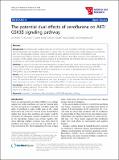| dc.contributor.author | Zhang, Lei | en_US |
| dc.contributor.author | Zhang, Jie | en_US |
| dc.contributor.author | Dong, Yuanlin | en_US |
| dc.contributor.author | Swain, Celeste A | en_US |
| dc.contributor.author | Zhang, Yiying | en_US |
| dc.contributor.author | Xie, Zhongcong | en_US |
| dc.date.accessioned | 2014-05-06T16:18:16Z | |
| dc.date.issued | 2014 | en_US |
| dc.identifier.citation | Zhang, Lei, Jie Zhang, Yuanlin Dong, Celeste A Swain, Yiying Zhang, and Zhongcong Xie. 2014. “The potential dual effects of sevoflurane on AKT/GSK3β signaling pathway.” Medical Gas Research 4 (1): 5. doi:10.1186/2045-9912-4-5. http://dx.doi.org/10.1186/2045-9912-4-5. | en |
| dc.identifier.issn | 2045-9912 | en |
| dc.identifier.uri | http://nrs.harvard.edu/urn-3:HUL.InstRepos:12152992 | |
| dc.description.abstract | Background: Anesthesia with multiple exposures of commonly used inhalation anesthetic sevoflurane induces neuroinflammation and cognitive impairment in young mice, but anesthesia with a single exposure to sevoflurane does not. AKT/glycogen synthase kinase 3β (GSK3β) signaling pathway is involved in neurotoxicity and neurobehavioral deficits. However, whether sevoflurane can induce a dual effect (increase versus decrease) on the activation of AKT/GSK3β signaling pathway remains to be determined. We therefore set out to assess the effects of sevoflurane on AKT/GSK3β signaling pathway in vivo and in vitro. Methods: Six day-old wild-type mice were exposed to 3% sevoflurane two hours daily for one or three days. In the in vitro studies, H4 human neuroglioma cells were treated with 4% sevoflurane for two or six hours. We then determined the effects of different sevoflurane treatments on the levels of phosphorylated (P)-GSK3β(ser9) and P-AKT(ser473) by using Western blot analysis. Results: Here we show that anesthesia with 3% sevoflurane two hours daily for one day increased the levels of P-GSK3β(ser9) and P-AKT(ser473), but the anesthesia with 3% sevoflurane daily for three days decreased them in the mice. The treatment with 4% sevoflurane for two hours increased, but the treatment with 4% sevoflurane for six hours decreased, the levels of P-GSK3β(ser9) and P-AKT(ser473) in the H4 human neuroglioma cells. Conclusions: Anesthetic sevoflurane might induce a dual effect (increase versus decrease) on the activation of the AKT/GSK3β signaling pathway. These studies have established a system to perform further studies to determine the effects of sevoflurane on brain function. | en |
| dc.language.iso | en_US | en |
| dc.publisher | BioMed Central | en |
| dc.relation.isversionof | doi:10.1186/2045-9912-4-5 | en |
| dc.relation.hasversion | http://www.ncbi.nlm.nih.gov/pmc/articles/PMC3996018/pdf/ | en |
| dash.license | LAA | en_US |
| dc.subject | Anesthetic | en |
| dc.subject | Sevoflurane | en |
| dc.subject | Phosphorylation | en |
| dc.subject | AKT/GSK3β signaling pathway | en |
| dc.title | The potential dual effects of sevoflurane on AKT/GSK3β signaling pathway | en |
| dc.type | Journal Article | en_US |
| dc.description.version | Version of Record | en |
| dc.relation.journal | Medical Gas Research | en |
| dash.depositing.author | Zhang, Lei | en_US |
| dc.date.available | 2014-05-06T16:18:16Z | |
| dc.identifier.doi | 10.1186/2045-9912-4-5 | * |
| dash.authorsordered | false | |
| dash.contributor.affiliated | Zhang, Lei | |
| dash.contributor.affiliated | Zhang, Yiying | |
| dash.contributor.affiliated | Xie, Zhongcong | |


